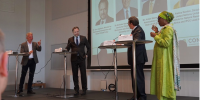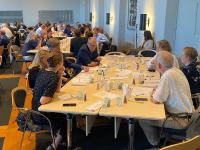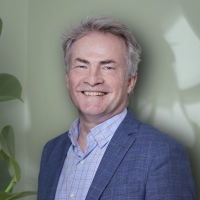Conference on Integrating Sustainable Development and Climate Change

The conference - Conference on Integrating Sustainable Development and Climate Change - brought together approx. 100 actors and professionals from the Danish development and climate environment, and had among the speakers Lord Nicholas Stern, chairman of the Center for Climate Change Economics and Policy at Leeds University, and the London School of Economics, as well as chairman of the "Global Commission for the Economy and Climate; Achim Steiner, UNDP Administrator; Dr. Fatima Denton, Director of the United Nations University Institute for Natural Resources in Africa and IPCC lead author; Pablo Vieira, director of the NDC Partnership; Gauri Singh, Deputy Director General of IRENA; and Rasmus Abildgaard Kristensen, Vice President, Head of Group Public Affairs, Danfoss.

The program for the conference and panelists can be seen here.
Lord Nicholas Stern opened the conference with a video message.
Ensuring global sustainable development and dealing with climate change are the two greatest challenges of our time for the planet and future generations. The solutions must be provided in a complex global post-COVID-19 situation characterized by polycrisis, geopolitics due to the Ukraine war, growing inequality, a large financing gap and increasing mistrust between the Global North and the Global South. That context calls for a holistic approach to the challenges and a rethinking of global cooperation.
The purpose of the conference was to provide input for solutions to the challenges from international and Danish actors, including for a new Danish development policy strategy in 2024, as well as a plan for Africa, which appears in the Government foundation.
Chairman's summary
Please find the Chair’s summary of messages and take aways from the conference presentations, panel debates and round table discussions below:
- Promoting global sustainable development and dealing with climate change are two sides of the same coin. If we fail at one, we fail at the other. Climate change is the result of decades of unsustainable and fossil-based development. A holistic approach is needed that integrates the UN's sustainable development goals and climate action based on national ownership, so that development priorities, emissions, adaptation, climate resilience and biodiversity are considered together in an inclusive, just transition globally, regionally, and nationally – both in the Global North and the Global South. Green corridors for decarbonization of international shipping and climate neutral cooling for example can address several SDGs and climate issues at the same time.
- There is a unique opportunity for global integration of climate and development to create a decisive new development and growth potential – a new paradigm in light of the many crises the world is going through right now, which hit the Global South hardest. It should be supported by ambitious political leadership and by investments of 2 to 3% of GDP annually, in the same way that 2% of GDP is invested in military security. Integration of climate and sustainable development in water, food, natural resources, raw materials, renewable energy, and energy efficiency is increasingly crucial for national, regional, and global security, but is not unfolding in national security strategies.
- An 'agenda of hope' and a new narrative are needed to deal with lost trust in the Global South. There are huge asymmetries between what we in the Global North say we want to do and what we do in terms of just, sustainable transition regarding issues such as exploitation, export and import of fossil fuels, carbon budgets and decarbonization across economies. When the Global North itself does not 'walk the talk’, net-zero framing and calls for decarbonization, which often have to be based on loans and indebtedness, become a very difficult sell in Africa. The rich countries must recognize their own responsibility for the existing climate crisis. The EU must establish new mutually beneficial partnerships based on common interests with, among others, Africa. This is the prerequisite for trust-based equal dialogue and cooperation. An 'agenda of hope' must be created as a framework for joint handling of common challenges. This requires new approaches to partnerships, international cooperation, financing, risk management, business models and technology transfers in all sectors. The focus should be on mutual learning between the Global North and South, e.g., within adaptation.
- A systemic 'whole of government' and 'whole of society' approach must be ensured across all value chains from the global to the local level, which enable the integration of the UN's Sustainable Development Goals and the Paris Agreement everywhere. National development plans and the national climate plans (NDCs) must be thought together, promoted by finance ministers and heads of government, and form the basis for public and private investment. It requires strengthened coordination throughout the value chain at both national and global level, as well as ensuring multi-stakeholder partnerships that involve the private sector and civil society, as well as other non-state actors in a timely manner.
- Manyfold greater investment and capital flows must be raised in support of the integrated development and climate efforts in the Global South. There is a particular need to ensure a focus on strengthening framework conditions, scaling risk hedging and management and the use of blended finance. All EU countries should reach the UN target of 0.7% of GNI for development financing. Redirecting fossil subsidies to investments in green transition, a tax on international shipping and, if possible, other taxes on carbon emissions, as well as a reform of the international development banks are central to this effort. Efforts must be made to reduce investment risks, i.a. by increasing government-to-government cooperation on transparent, predictable regulation, capacity building within renewable energy, promotion of transparent investment policies, use of guarantees and blended finance and thereby reducing capital costs and the price of renewable energy in the least developed countries. There is also a need for solutions that do not indebt developing countries working to integrate development and climate.
- Denmark should use the Danish EU Presidency in 2025 to work for investments in the integration of sustainable development and climate, including getting other EU countries to set aside 0.7% of GNI in support of development. Going forward, Denmark should both focus on cooperation with countries with widespread poverty and countries that are driving the green transition. Danish country presence/knowledge to also be able to bring the private sector and civil society into play, and areas such as water, energy, food, and vocational training, where Denmark has special competences, should be included in the selection of cooperation areas. Denmark should strengthen Government-to-Government cooperation to be able to support the work on transparent framework conditions on energy, water, and food and to support the training of employees to improve qualifications of the national workforce to drive the green transition. Denmark should therefore focus further on "skills development" where it is needed. For the same reason, Denmark should second more Danish experts to partner organizations in cooperation countries to optimize and build capacity in these countries. Mutual exchange of knowledge should be promoted between the rich countries and partner countries - especially on climate adaptation. Access to venture capital is often a problem, and Denmark should intensify efforts to create additional financial mechanisms, among other things through IFU, which can assume part of the investor risk and thereby reduce the cost of the green transition in developing countries.

